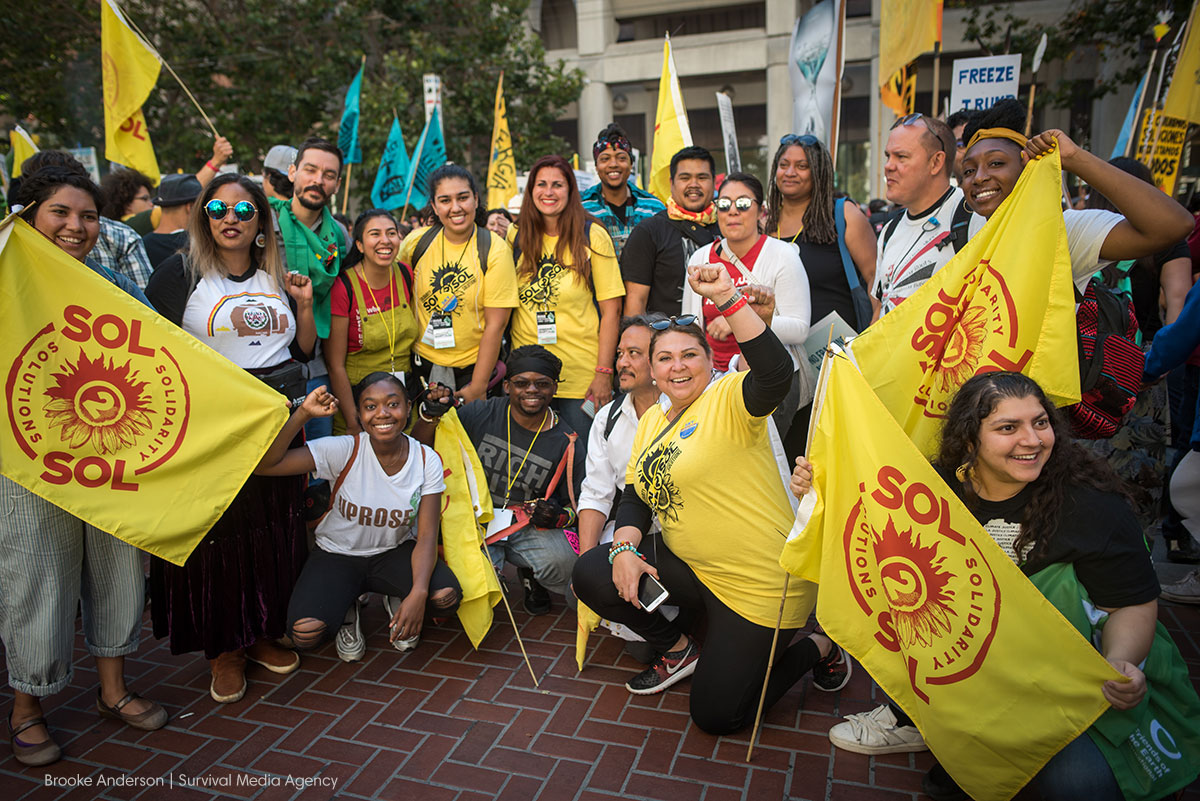RAN Community Action Grants: Provide crucial, rapid funding for people fighting injustice in their own communities
These small grants provide an alternative model to more traditional ‘buy-an-acre’ or carbon offset initiatives which, while well meaning, can be problematic in practice.
Though Indigenous Peoples comprise just 5% of the world’s population, the lands they steward protect a stunning eighty percent of life on earth. Science and an abundance of evidence through history make it clear that keeping forests standing is absolutely critical to successfully confronting the climate crisis, as well as avoiding future pandemic outbreaks like Covid-19.
With your support, we can create a stronger global movement to protect our planet.
Support grassroots leadership on the frontlines.
RAN has two small grant vehicles, the Protect and Acre program which focuses on supporting grassroots leadership in forest regions and the Climate Action Fund which supports frontline communities resisting destruction from the fossil fuel industry.
Protect an Acre: Where human rights and forest protection come together
Protect an Acre (PAA) is a direct alternative to “buy-an-acre” programs that seek to provide rainforest protection by buying tracts of land. Too often, those programs fail to address the priorities and rights of local Indigenous peoples. Also, uninhabited forest areas often go unprotected, even if purchased through a buy-an-acre program. It is not uncommon for loggers, oil and gas companies, cattle ranchers and miners to illegally extract resources from areas “protected” by these programs.At the heart of PAA lies RAN’s firm belief that traditional forest communities are the best stewards of the land — because their way of life depends upon the health of their environment. Recent studies add to the growing body of evidence that Indigenous peoples are better protectors of their forests than governments or industry.
Protect An Acre grants support grassroots leadership and local organizations in forest regions to protect threatened forest lands and to protect the human rights of communities that have coexisted with and depended on these regions for generations.
These grants (generally $5,000-$15,000) are critical to help local activists regain control of and sustainably manage traditional territories. With your support, grassroots organizations can launch successful land title initiatives, create powerful community education programs, develop sustainable economic alternatives and build lasting grassroots resistance to destructive industrial activities.
PAA is core to RAN’s commitment to supporting the livelihoods and right to self-determination of forest communities, promoting safe and respectful labor rights, and fighting against human rights abuses frequently associated with logging, pulp and paper mills, mining and other extractive industries.
With your support, we can create a stronger global movement to protect our planet.
The Climate Action Fund: Support for frontline communities challenging the fossil fuel industry
Climate Action Fund (CAF) provides small grants (generally $5,000-$10,000) to local groups tackling the root causes of climate change — the extraction and combustion of fossil fuels such as coal, oil and tar sands.The Climate Action Fund is an operational system to reduce RAN’s carbon footprint — and we are offering this system to any individuals and organizations looking for a grassroots alternative to carbon offset programs.
Direct Support vs Carbon Offsets
RAN estimates that each of our staff members is responsible for an average of 5 tons of CO2 per year for their work-related activities, including travel and resource consumption. Instead of purchasing carbon credits to offset this climate impact, RAN has calculated relevant dollar amounts for this carbon footprint, and commits these funds to empower frontline communities to keep fossil fuels in the ground where they belong.
CAF supports local communities and activists across the globe who are the key players in directly challenging the source of climate change and getting lasting results. In their efforts to stop new carbon-emitting projects and to shut down old ones, these communities are protecting their livelihoods against polluting industries and fighting to secure a clean energy future for everyone. And your support to this program can have a huge impact — these groups are on the frontlines of efforts to stop the largest, dirtiest, and most carbon intensive industries, and many of them are volunteer-based and have very few resources.
By supporting CAF, you will help build the grassroots climate activist movement.
Donate to the Climate Action Fund













